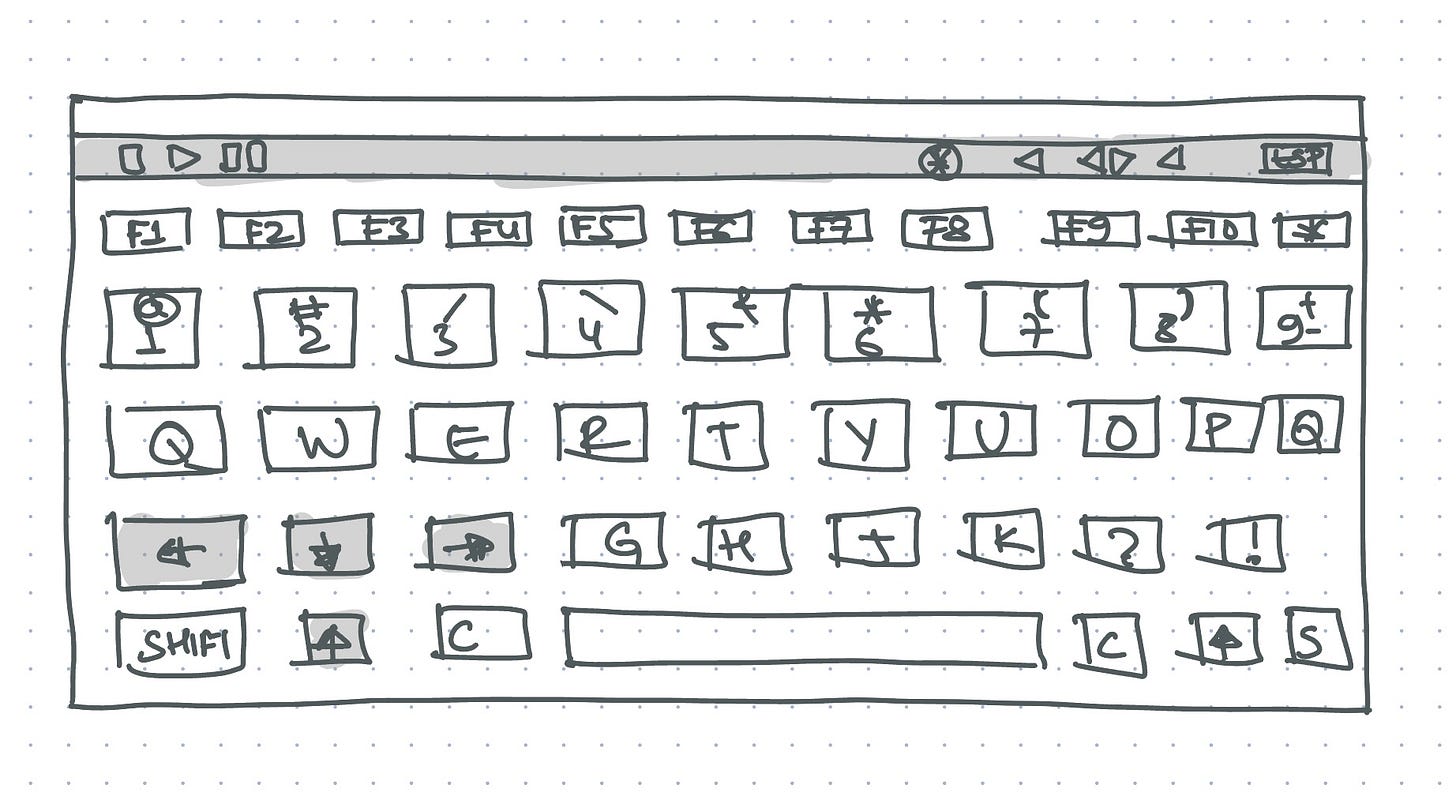First, Do you know your keyboard?
Let’s do an experiment.
Take a blank piece of paper and a pencil or pen.
Walk away from your computer or laptop.
Then, draw a figure of your keyboard - write down the arrangement of the keys.
Don’t cheat, just draw your keyboard from the scratch.
Here’s what I was able to draw:
Looks like I missed a lot of keys. I can’t believe that I even missed the “Return” key (which is the Enter key on a pc).
I don’t know about you, but I learned typing in a very explicit way. I also played a lot of typing games in the beginning. That helped me learn the ‘correct’ way, putting my left hand fingers over a s d f, and my right hand fingers over j k l ;
And after years of using it, almost all of the key positions are embedded permanently in my memory. I don’t have to “remember” and even look where the keys are on the keyboard, my fingers automatically know where to press as I type away.
What was once explicit becomes implicit over time.
I’ve been following Benjamin Keep’s youtube channel for a while. In this video, he explains how the explicit/concrete knowledge eventually becomes tacit/abstract through repetition and experience.
Here are some insights from the video that directly relates to learning and teaching.
“Most learning in school is explicit knowledge, which can be verbalized and taught.”
And on the basis of that, we eventually develop a form of knowledge called tacit knowledge that further drives much of our “new” learning.
“As experts, we chunk knowledge into automatic processes. However, experts often fail to recognize the gaps in understanding of beginners, which makes teaching more difficult - such as when a baker assumes others understand what ‘creaming butter and sugar’ means.”
Most teachers have vast domain knowledge and as a result - unconsciously - they develop Expert Blindness. In other words, Curse of Knowledge.
“Driving starts with explicit instructions (e.g., where to place hands and feet), but over time, it becomes tacit knowledge, with actions becoming automatic and unconscious.”
This aligns with the learning phases where a novice starts with acquisition of knowledge, then moves into fluency phase through a lot of practice, and eventually to a generalization phase or adaptation phase. And at this stage, most of the concrete details in the initial phases turn into tacit forms.
“Some tacit knowledge, such as language, cannot be fully explained or transferred. A person with access to a database of translations (like in the Chinese language example) wouldn’t truly ‘know’ the language, as it requires social interaction and continuous adaptation to cultural nuances.”
Learning is individual. But learning is also social. We learn, refine, and learn more through social interactions.
Curse of Knowledge
Experts, experienced people, and teachers operate on implicit knowledge. That’s why they are experts.
Unfortunately, I’ve seen this happen too often in the classes, workshops, and training sessions. An amazing expert with a vast domain experience, who just can’t teach or explain or train.
They operate on their implicit knowledge, moving seamlessly through ideas and concepts that took them years to learn and internalize. But when they try to explain it to students, they gloss over the details that actually matter to a novice. They see the “forest”, but the learner needs the “trees”.
And this might be a bad news for most learners if their teacher suffers from Curse of Knowledge.
In a class, the teacher might just assume that the students would understand certain foundational ideas. But the students may not. It’s not because the students are lazy or incapable, it’s just that they need the solid foundation: one that starts with small, concrete steps before jumping into abstract reasoning.
This is the curse of knowledge in action. Experts forget what it was like not to know something. And if they can’t adjust their teaching to match where their students are, learning suffers.
Understand How Learning Happens
The most effective teachers aren’t just experts in their subjects or domain, they are experts in bridging knowledge gaps.
That means, they recognize that learners start with concrete details before they can grasp abstract concepts. They understand that their job is two folds: to impart knowledge and to translate the knowledge into stepping stones that guide students forward.
This is why effective teaching requires more than just subject expertise. It demands deep understanding of how learning happens, how novices and experts think differently, and how to align teaching to the students’ level.
So teachers, be aware of potential Curse of Knowledge. You can then be more intentional about your teaching, and design learning process to go through explicit instruction, modelling, scaffolding, using examples, independent practice, checking for understanding, and gradually transitioning from concrete to abstract.





